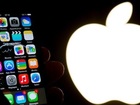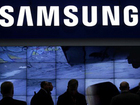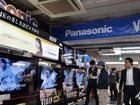South Korean electronics giant Samsung Electronics Co. has started domestic sales of high-end televisions powered by its Tizen operating system and plans to add washing machines, fridges and other appliances to the range of products that use the software.
Samsung said sales of Tizen-powered ultra-HD TVs began Thursday in South Korea. The new TVs come in four sizes from 55 inches diagonally to 88 inches. The smallest model costs 5.49 million won ($5,000).
 Full Story
Full Story
Apple is in talks aimed at getting hold of content for a pay-television service, technology news website Re/code reported on Wednesday.
The California-based maker of iPhones, iPads, iPods, Macintosh computers and Apple TV boxes is exploring the potential for deals that would let it sell bundles of programming directly to viewers.
 Full Story
Full Story
Apple unveiled plans Monday to pump $2 billion over the coming decade into a data center "global command" facility in the southwest state of Arizona.
The project represents one of the largest investments ever by the maker of the iPhone, iPod, iPad and Macintosh computer.
 Full Story
Full Story
One of China's biggest Internet portals has been accused of "rumor-mongering" and other offences by Communist authorities as Beijing furthers its online clampdown.
In a statement posted on its website late Monday, the Cyberspace Administration of China (CAC) said that authorities met with representatives of Netease to discuss "problems" in the company's operations.
 Full Story
Full Story
Samsung is to launch a range of smart refrigerators, air conditioners and washing machines as its seeks to expand its business in Internet-connected homes, a top executive said Tuesday.
The South Korean tech giant is seeking to plough more resources into the so-called Internet of Things (IoT) as the market for smartphones -- one of its core product categories -- becomes increasingly saturated.
 Full Story
Full Story
All commercial flights worldwide could soon send out an automated signal every minute in times of distress to help rescuers find downed aircraft more easily.
The new measures are in response to last year's disappearance of Malaysia Airlines flight MH370 en route from Kuala Lumpur to Beijing in what remains one of history's great aviation mysteries.
 Full Story
Full Story
Google has turned into a stock market laggard as the shift to mobile devices has lowered the Internet search leader's digital ad prices and the company's expensive investments in far-out technology has trimmed its profit margins.
Those factors have left some investors wondering what Google might do to boost its stock price, especially after the company's latest financial report. The earnings released late Thursday missed analyst targets, marking the fifth consecutive quarter that has happened.
 Full Story
Full Story
The U.S. government is getting more than $41 billion from an auction of wireless spectrum, highlighting surging demand for new devices that connect to the Internet, officials said Friday.
The Federal Communications Commission, which revised down its estimate from $45 billion, said the auction that ended Thursday raised the highest amount ever for this type of sale and would improve wireless access countrywide.
 Full Story
Full Story
Panasonic has closed its last remaining TV manufacturing factory in China and is to sell its plant in Mexico as part of a restructuring plan aimed at stemming losses, a newspaper said Saturday.
The Japanese electronics giant was forced to pull the plug on local production in the two countries due to a sharp decline in TV prices in North America and China, the Nikkei newspaper said.
 Full Story
Full Story
Google profit jumped in the recently ended quarter, but the leap fell short of market expectations as smartphone-centric lifestyles brought with them a shift to cheaper mobile ads.
Google shares whipsawed, losing ground and then gaining, as Wall Street came to grips with concerns about a shift to lower-cost ads on mobile devices and the technology titan's penchant for spending on "moonshots" like self-driving cars and Internet-linked Glass eyewear.
 Full Story
Full Story



